Corporation Law Report: FWPL, Dividends, and Share Buybacks
VerifiedAdded on 2019/11/26
|8
|1505
|223
Report
AI Summary
This report delves into Corporation Law, specifically examining the case of FWPL and its handling of dividends, share buybacks, and capital reduction. The analysis addresses three key questions: the actions available to the Galli grandchildren regarding non-payment of dividends, the options for FWPL to buy out A Class shareholders, and the possibility of eliminating A Class shares through capital reduction. The report references the Corporations Act 2001, focusing on sections related to director's duties (care, diligence, good faith, and misuse of position), share buybacks (on-market, equal access, selective, employee share scheme, and minimum holding), and capital reduction. It explores the legal implications of these financial decisions, considering shareholder rights, solvency, and the responsibilities of the company's directors. The report concludes by offering insights into the legal considerations and potential outcomes of each scenario, emphasizing the importance of fairness, solvency, and adherence to the Corporations Act 2001.

CORPORATION LAW 1
Name
Course
Professor’s Name
University
Date Due
Name
Course
Professor’s Name
University
Date Due
Paraphrase This Document
Need a fresh take? Get an instant paraphrase of this document with our AI Paraphraser
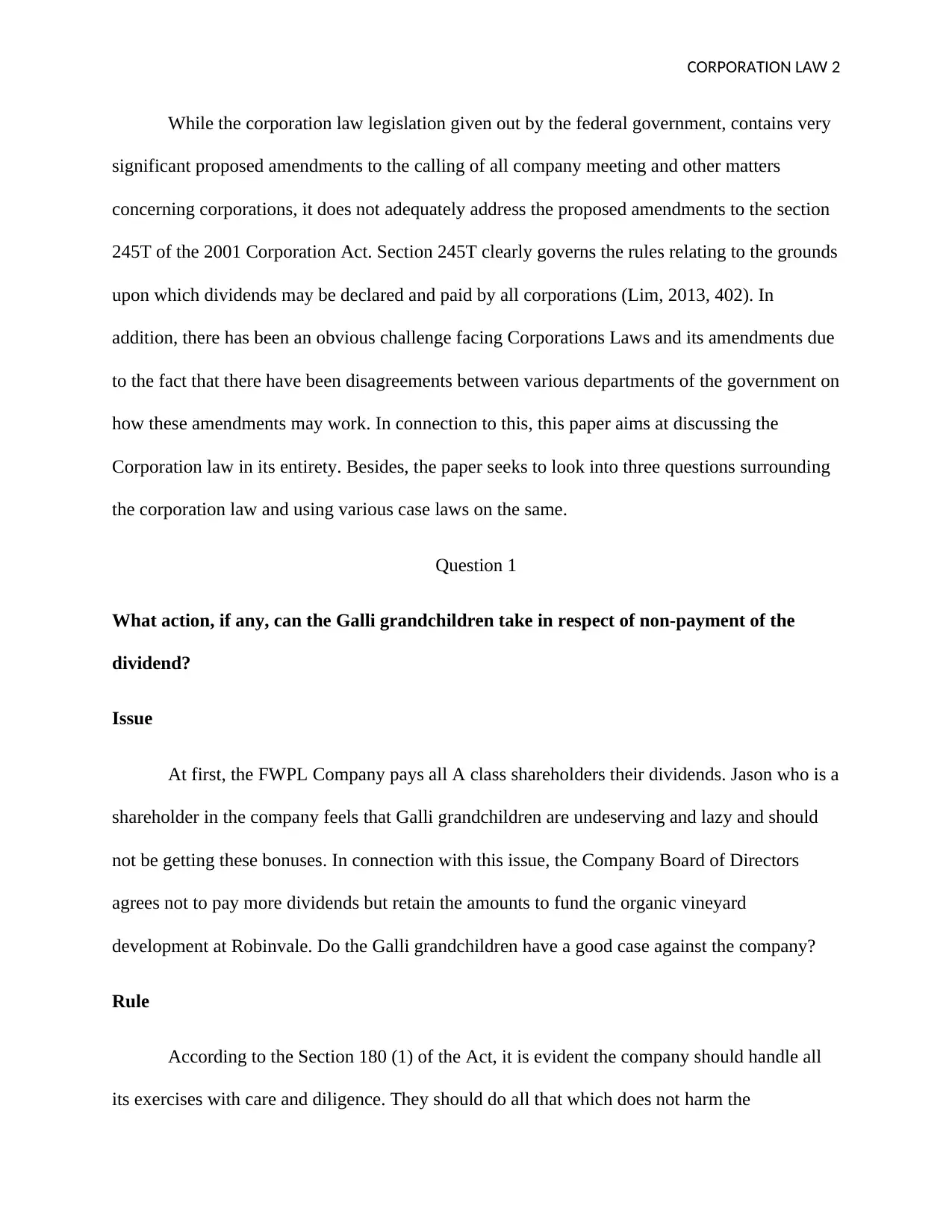
CORPORATION LAW 2
While the corporation law legislation given out by the federal government, contains very
significant proposed amendments to the calling of all company meeting and other matters
concerning corporations, it does not adequately address the proposed amendments to the section
245T of the 2001 Corporation Act. Section 245T clearly governs the rules relating to the grounds
upon which dividends may be declared and paid by all corporations (Lim, 2013, 402). In
addition, there has been an obvious challenge facing Corporations Laws and its amendments due
to the fact that there have been disagreements between various departments of the government on
how these amendments may work. In connection to this, this paper aims at discussing the
Corporation law in its entirety. Besides, the paper seeks to look into three questions surrounding
the corporation law and using various case laws on the same.
Question 1
What action, if any, can the Galli grandchildren take in respect of non-payment of the
dividend?
Issue
At first, the FWPL Company pays all A class shareholders their dividends. Jason who is a
shareholder in the company feels that Galli grandchildren are undeserving and lazy and should
not be getting these bonuses. In connection with this issue, the Company Board of Directors
agrees not to pay more dividends but retain the amounts to fund the organic vineyard
development at Robinvale. Do the Galli grandchildren have a good case against the company?
Rule
According to the Section 180 (1) of the Act, it is evident the company should handle all
its exercises with care and diligence. They should do all that which does not harm the
While the corporation law legislation given out by the federal government, contains very
significant proposed amendments to the calling of all company meeting and other matters
concerning corporations, it does not adequately address the proposed amendments to the section
245T of the 2001 Corporation Act. Section 245T clearly governs the rules relating to the grounds
upon which dividends may be declared and paid by all corporations (Lim, 2013, 402). In
addition, there has been an obvious challenge facing Corporations Laws and its amendments due
to the fact that there have been disagreements between various departments of the government on
how these amendments may work. In connection to this, this paper aims at discussing the
Corporation law in its entirety. Besides, the paper seeks to look into three questions surrounding
the corporation law and using various case laws on the same.
Question 1
What action, if any, can the Galli grandchildren take in respect of non-payment of the
dividend?
Issue
At first, the FWPL Company pays all A class shareholders their dividends. Jason who is a
shareholder in the company feels that Galli grandchildren are undeserving and lazy and should
not be getting these bonuses. In connection with this issue, the Company Board of Directors
agrees not to pay more dividends but retain the amounts to fund the organic vineyard
development at Robinvale. Do the Galli grandchildren have a good case against the company?
Rule
According to the Section 180 (1) of the Act, it is evident the company should handle all
its exercises with care and diligence. They should do all that which does not harm the
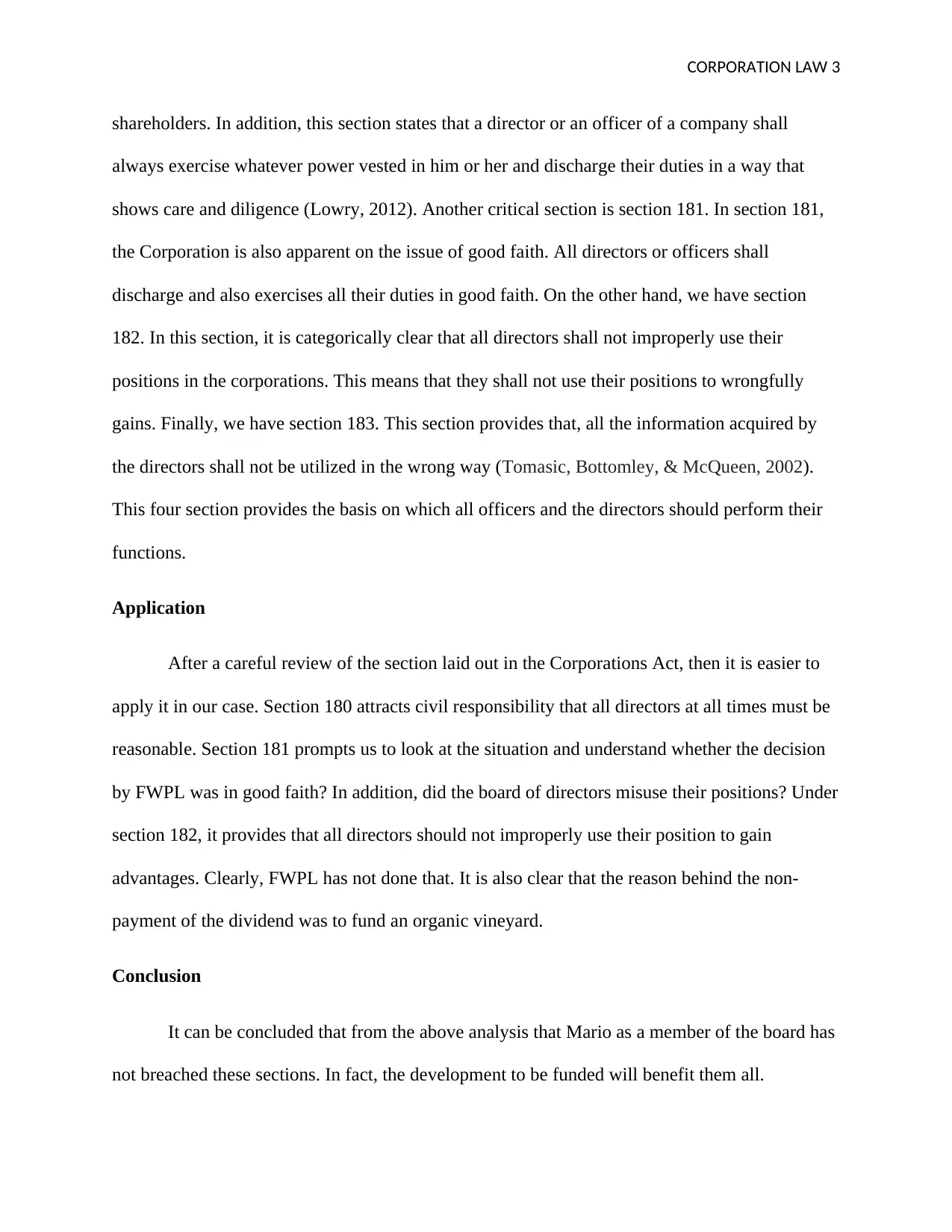
CORPORATION LAW 3
shareholders. In addition, this section states that a director or an officer of a company shall
always exercise whatever power vested in him or her and discharge their duties in a way that
shows care and diligence (Lowry, 2012). Another critical section is section 181. In section 181,
the Corporation is also apparent on the issue of good faith. All directors or officers shall
discharge and also exercises all their duties in good faith. On the other hand, we have section
182. In this section, it is categorically clear that all directors shall not improperly use their
positions in the corporations. This means that they shall not use their positions to wrongfully
gains. Finally, we have section 183. This section provides that, all the information acquired by
the directors shall not be utilized in the wrong way (Tomasic, Bottomley, & McQueen, 2002).
This four section provides the basis on which all officers and the directors should perform their
functions.
Application
After a careful review of the section laid out in the Corporations Act, then it is easier to
apply it in our case. Section 180 attracts civil responsibility that all directors at all times must be
reasonable. Section 181 prompts us to look at the situation and understand whether the decision
by FWPL was in good faith? In addition, did the board of directors misuse their positions? Under
section 182, it provides that all directors should not improperly use their position to gain
advantages. Clearly, FWPL has not done that. It is also clear that the reason behind the non-
payment of the dividend was to fund an organic vineyard.
Conclusion
It can be concluded that from the above analysis that Mario as a member of the board has
not breached these sections. In fact, the development to be funded will benefit them all.
shareholders. In addition, this section states that a director or an officer of a company shall
always exercise whatever power vested in him or her and discharge their duties in a way that
shows care and diligence (Lowry, 2012). Another critical section is section 181. In section 181,
the Corporation is also apparent on the issue of good faith. All directors or officers shall
discharge and also exercises all their duties in good faith. On the other hand, we have section
182. In this section, it is categorically clear that all directors shall not improperly use their
positions in the corporations. This means that they shall not use their positions to wrongfully
gains. Finally, we have section 183. This section provides that, all the information acquired by
the directors shall not be utilized in the wrong way (Tomasic, Bottomley, & McQueen, 2002).
This four section provides the basis on which all officers and the directors should perform their
functions.
Application
After a careful review of the section laid out in the Corporations Act, then it is easier to
apply it in our case. Section 180 attracts civil responsibility that all directors at all times must be
reasonable. Section 181 prompts us to look at the situation and understand whether the decision
by FWPL was in good faith? In addition, did the board of directors misuse their positions? Under
section 182, it provides that all directors should not improperly use their position to gain
advantages. Clearly, FWPL has not done that. It is also clear that the reason behind the non-
payment of the dividend was to fund an organic vineyard.
Conclusion
It can be concluded that from the above analysis that Mario as a member of the board has
not breached these sections. In fact, the development to be funded will benefit them all.
⊘ This is a preview!⊘
Do you want full access?
Subscribe today to unlock all pages.

Trusted by 1+ million students worldwide
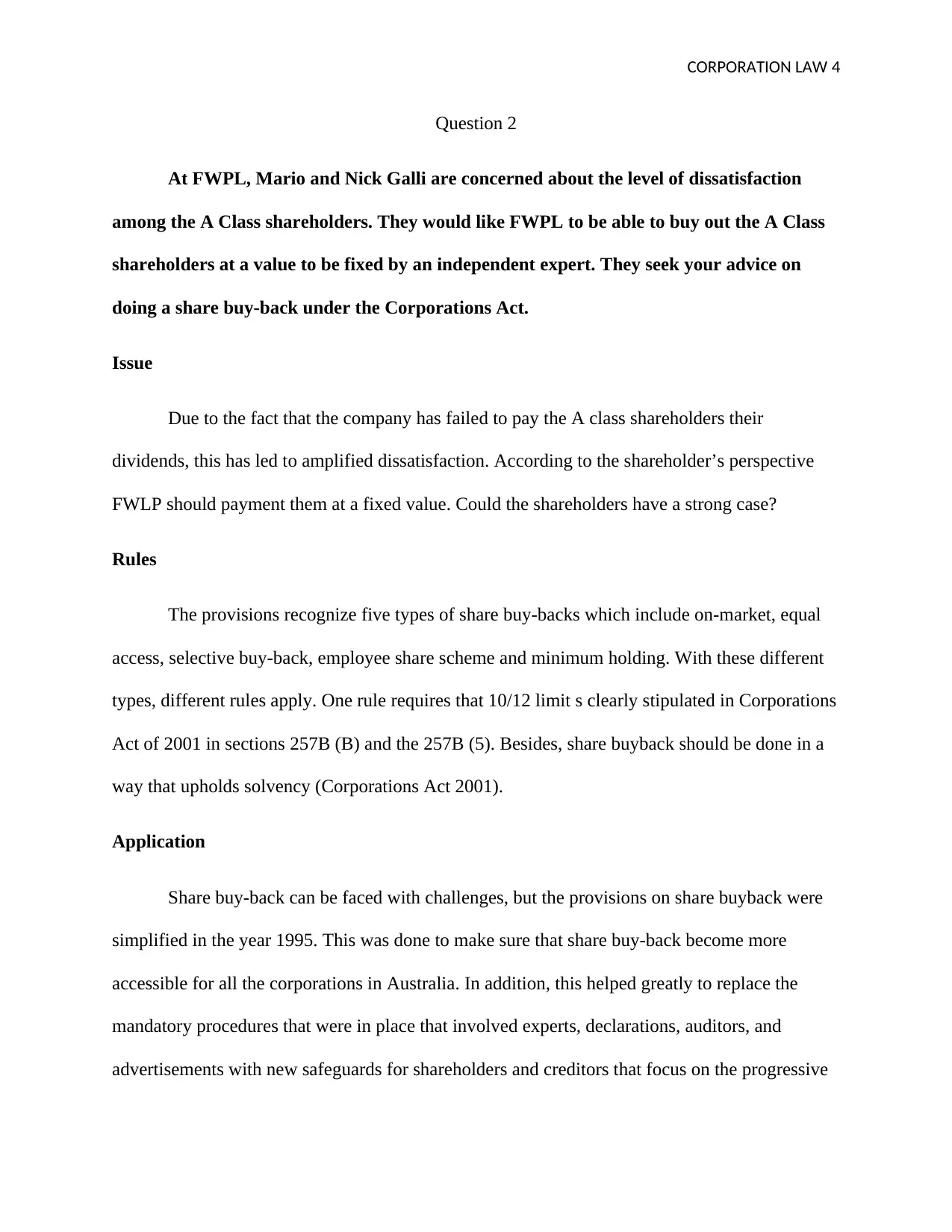
CORPORATION LAW 4
Question 2
At FWPL, Mario and Nick Galli are concerned about the level of dissatisfaction
among the A Class shareholders. They would like FWPL to be able to buy out the A Class
shareholders at a value to be fixed by an independent expert. They seek your advice on
doing a share buy-back under the Corporations Act.
Issue
Due to the fact that the company has failed to pay the A class shareholders their
dividends, this has led to amplified dissatisfaction. According to the shareholder’s perspective
FWLP should payment them at a fixed value. Could the shareholders have a strong case?
Rules
The provisions recognize five types of share buy-backs which include on-market, equal
access, selective buy-back, employee share scheme and minimum holding. With these different
types, different rules apply. One rule requires that 10/12 limit s clearly stipulated in Corporations
Act of 2001 in sections 257B (B) and the 257B (5). Besides, share buyback should be done in a
way that upholds solvency (Corporations Act 2001).
Application
Share buy-back can be faced with challenges, but the provisions on share buyback were
simplified in the year 1995. This was done to make sure that share buy-back become more
accessible for all the corporations in Australia. In addition, this helped greatly to replace the
mandatory procedures that were in place that involved experts, declarations, auditors, and
advertisements with new safeguards for shareholders and creditors that focus on the progressive
Question 2
At FWPL, Mario and Nick Galli are concerned about the level of dissatisfaction
among the A Class shareholders. They would like FWPL to be able to buy out the A Class
shareholders at a value to be fixed by an independent expert. They seek your advice on
doing a share buy-back under the Corporations Act.
Issue
Due to the fact that the company has failed to pay the A class shareholders their
dividends, this has led to amplified dissatisfaction. According to the shareholder’s perspective
FWLP should payment them at a fixed value. Could the shareholders have a strong case?
Rules
The provisions recognize five types of share buy-backs which include on-market, equal
access, selective buy-back, employee share scheme and minimum holding. With these different
types, different rules apply. One rule requires that 10/12 limit s clearly stipulated in Corporations
Act of 2001 in sections 257B (B) and the 257B (5). Besides, share buyback should be done in a
way that upholds solvency (Corporations Act 2001).
Application
Share buy-back can be faced with challenges, but the provisions on share buyback were
simplified in the year 1995. This was done to make sure that share buy-back become more
accessible for all the corporations in Australia. In addition, this helped greatly to replace the
mandatory procedures that were in place that involved experts, declarations, auditors, and
advertisements with new safeguards for shareholders and creditors that focus on the progressive
Paraphrase This Document
Need a fresh take? Get an instant paraphrase of this document with our AI Paraphraser
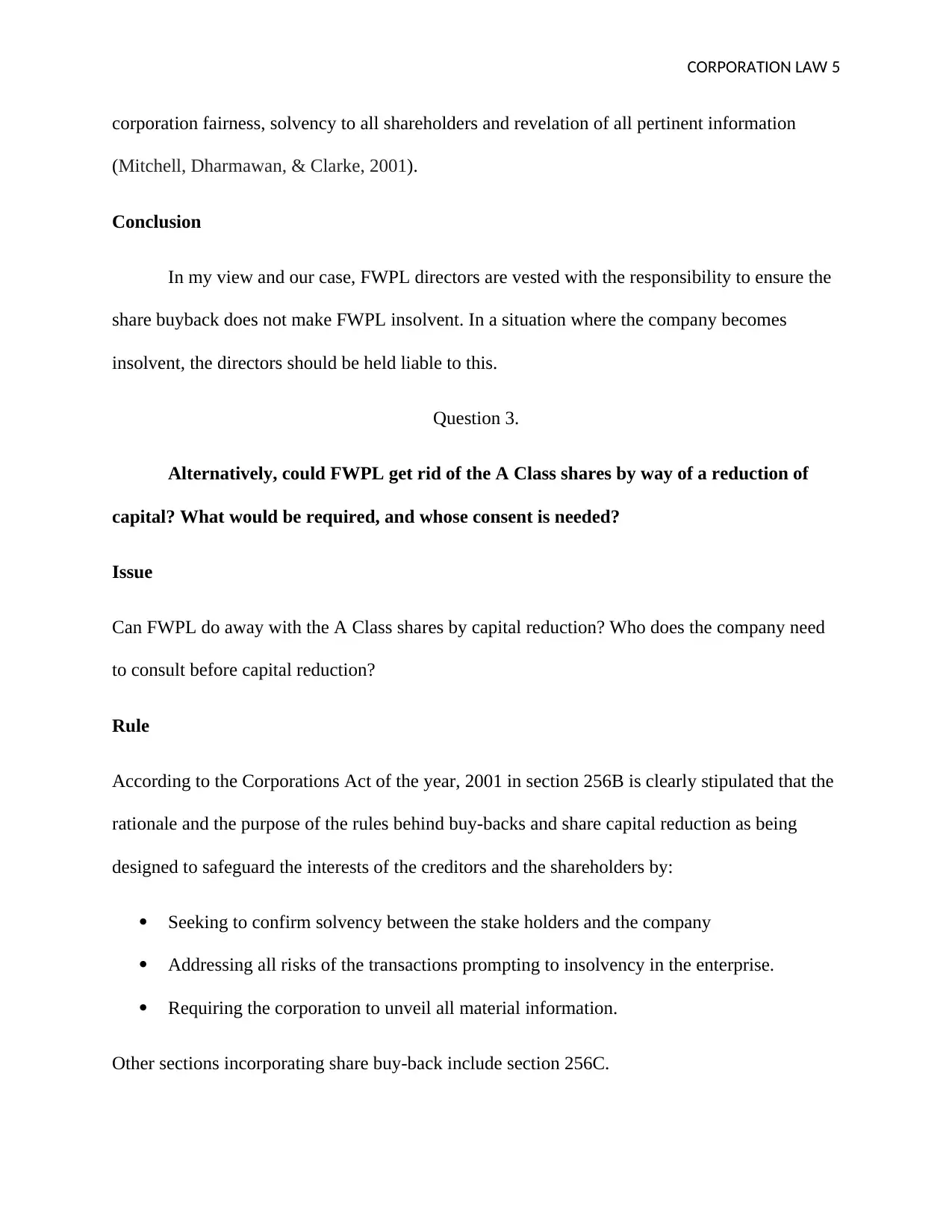
CORPORATION LAW 5
corporation fairness, solvency to all shareholders and revelation of all pertinent information
(Mitchell, Dharmawan, & Clarke, 2001).
Conclusion
In my view and our case, FWPL directors are vested with the responsibility to ensure the
share buyback does not make FWPL insolvent. In a situation where the company becomes
insolvent, the directors should be held liable to this.
Question 3.
Alternatively, could FWPL get rid of the A Class shares by way of a reduction of
capital? What would be required, and whose consent is needed?
Issue
Can FWPL do away with the A Class shares by capital reduction? Who does the company need
to consult before capital reduction?
Rule
According to the Corporations Act of the year, 2001 in section 256B is clearly stipulated that the
rationale and the purpose of the rules behind buy-backs and share capital reduction as being
designed to safeguard the interests of the creditors and the shareholders by:
Seeking to confirm solvency between the stake holders and the company
Addressing all risks of the transactions prompting to insolvency in the enterprise.
Requiring the corporation to unveil all material information.
Other sections incorporating share buy-back include section 256C.
corporation fairness, solvency to all shareholders and revelation of all pertinent information
(Mitchell, Dharmawan, & Clarke, 2001).
Conclusion
In my view and our case, FWPL directors are vested with the responsibility to ensure the
share buyback does not make FWPL insolvent. In a situation where the company becomes
insolvent, the directors should be held liable to this.
Question 3.
Alternatively, could FWPL get rid of the A Class shares by way of a reduction of
capital? What would be required, and whose consent is needed?
Issue
Can FWPL do away with the A Class shares by capital reduction? Who does the company need
to consult before capital reduction?
Rule
According to the Corporations Act of the year, 2001 in section 256B is clearly stipulated that the
rationale and the purpose of the rules behind buy-backs and share capital reduction as being
designed to safeguard the interests of the creditors and the shareholders by:
Seeking to confirm solvency between the stake holders and the company
Addressing all risks of the transactions prompting to insolvency in the enterprise.
Requiring the corporation to unveil all material information.
Other sections incorporating share buy-back include section 256C.
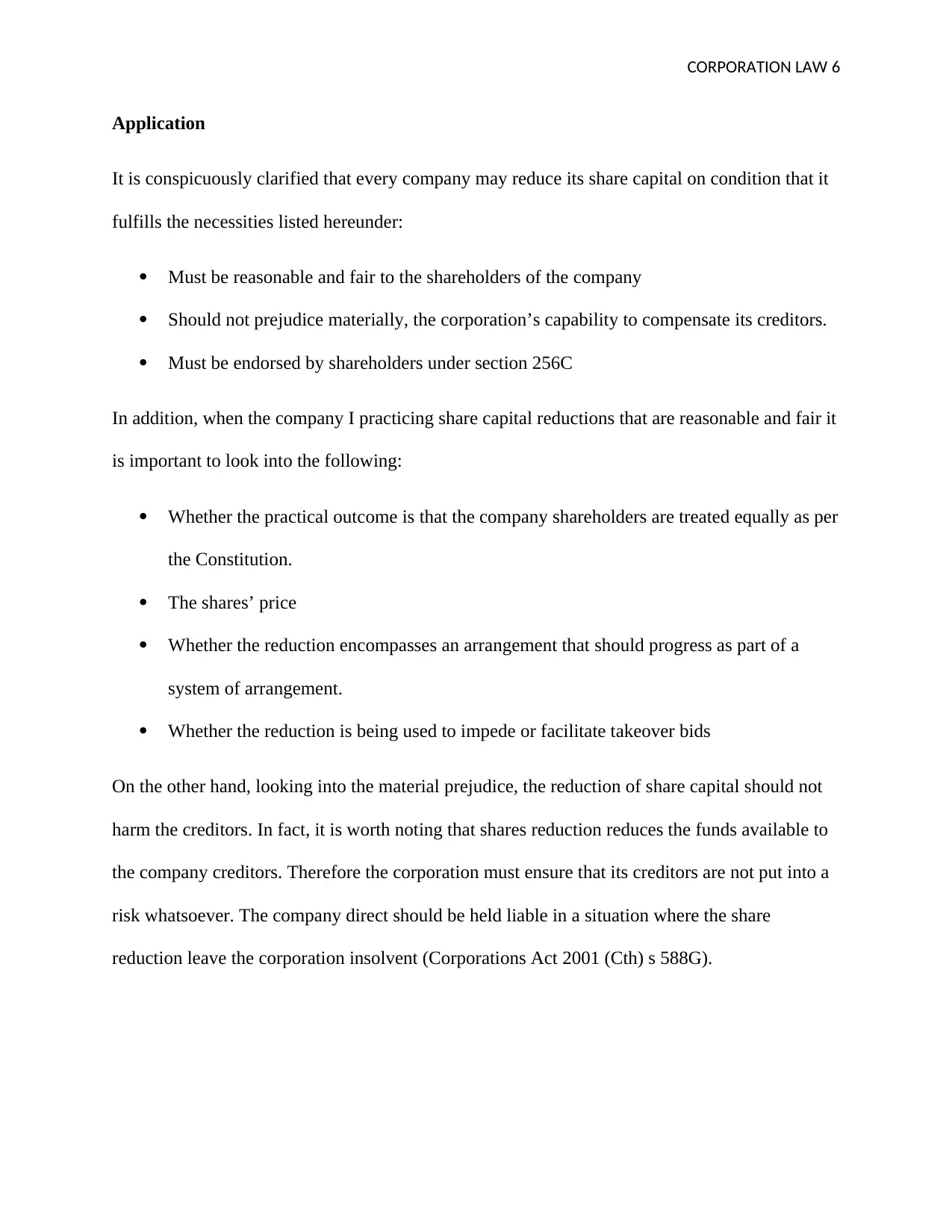
CORPORATION LAW 6
Application
It is conspicuously clarified that every company may reduce its share capital on condition that it
fulfills the necessities listed hereunder:
Must be reasonable and fair to the shareholders of the company
Should not prejudice materially, the corporation’s capability to compensate its creditors.
Must be endorsed by shareholders under section 256C
In addition, when the company I practicing share capital reductions that are reasonable and fair it
is important to look into the following:
Whether the practical outcome is that the company shareholders are treated equally as per
the Constitution.
The shares’ price
Whether the reduction encompasses an arrangement that should progress as part of a
system of arrangement.
Whether the reduction is being used to impede or facilitate takeover bids
On the other hand, looking into the material prejudice, the reduction of share capital should not
harm the creditors. In fact, it is worth noting that shares reduction reduces the funds available to
the company creditors. Therefore the corporation must ensure that its creditors are not put into a
risk whatsoever. The company direct should be held liable in a situation where the share
reduction leave the corporation insolvent (Corporations Act 2001 (Cth) s 588G).
Application
It is conspicuously clarified that every company may reduce its share capital on condition that it
fulfills the necessities listed hereunder:
Must be reasonable and fair to the shareholders of the company
Should not prejudice materially, the corporation’s capability to compensate its creditors.
Must be endorsed by shareholders under section 256C
In addition, when the company I practicing share capital reductions that are reasonable and fair it
is important to look into the following:
Whether the practical outcome is that the company shareholders are treated equally as per
the Constitution.
The shares’ price
Whether the reduction encompasses an arrangement that should progress as part of a
system of arrangement.
Whether the reduction is being used to impede or facilitate takeover bids
On the other hand, looking into the material prejudice, the reduction of share capital should not
harm the creditors. In fact, it is worth noting that shares reduction reduces the funds available to
the company creditors. Therefore the corporation must ensure that its creditors are not put into a
risk whatsoever. The company direct should be held liable in a situation where the share
reduction leave the corporation insolvent (Corporations Act 2001 (Cth) s 588G).
⊘ This is a preview!⊘
Do you want full access?
Subscribe today to unlock all pages.

Trusted by 1+ million students worldwide

CORPORATION LAW 7
Conclusion
In conclusion, prior to the share reduction process, a meeting or rather engagement of the
shareholders and the creditors should be done. Besides, the process should be carried out in a
way that does not lead to insolvency.
Conclusion
In conclusion, prior to the share reduction process, a meeting or rather engagement of the
shareholders and the creditors should be done. Besides, the process should be carried out in a
way that does not lead to insolvency.
Paraphrase This Document
Need a fresh take? Get an instant paraphrase of this document with our AI Paraphraser
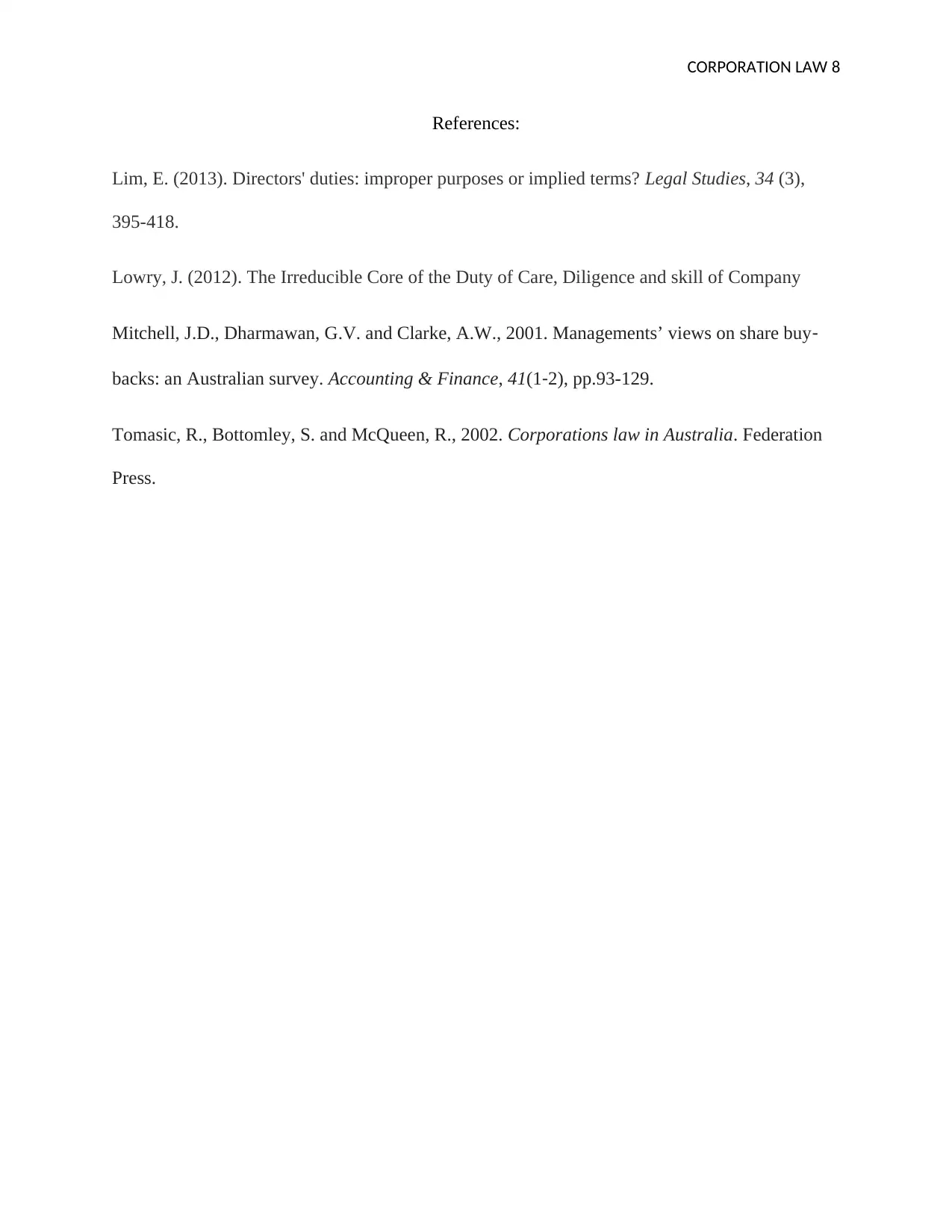
CORPORATION LAW 8
References:
Lim, E. (2013). Directors' duties: improper purposes or implied terms? Legal Studies, 34 (3),
395-418.
Lowry, J. (2012). The Irreducible Core of the Duty of Care, Diligence and skill of Company
Mitchell, J.D., Dharmawan, G.V. and Clarke, A.W., 2001. Managements’ views on share buy‐
backs: an Australian survey. Accounting & Finance, 41(1‐2), pp.93-129.
Tomasic, R., Bottomley, S. and McQueen, R., 2002. Corporations law in Australia. Federation
Press.
References:
Lim, E. (2013). Directors' duties: improper purposes or implied terms? Legal Studies, 34 (3),
395-418.
Lowry, J. (2012). The Irreducible Core of the Duty of Care, Diligence and skill of Company
Mitchell, J.D., Dharmawan, G.V. and Clarke, A.W., 2001. Managements’ views on share buy‐
backs: an Australian survey. Accounting & Finance, 41(1‐2), pp.93-129.
Tomasic, R., Bottomley, S. and McQueen, R., 2002. Corporations law in Australia. Federation
Press.
1 out of 8
Related Documents
Your All-in-One AI-Powered Toolkit for Academic Success.
+13062052269
info@desklib.com
Available 24*7 on WhatsApp / Email
![[object Object]](/_next/static/media/star-bottom.7253800d.svg)
Unlock your academic potential
Copyright © 2020–2026 A2Z Services. All Rights Reserved. Developed and managed by ZUCOL.




![Detailed Analysis of the ASIC v Flugge (No 2) [2017] VSC 117 Case](/_next/image/?url=https%3A%2F%2Fdesklib.com%2Fmedia%2Fimages%2Fmt%2Fec4e36a8265a4eb19a3349d48f208406.jpg&w=256&q=75)
